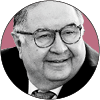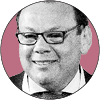The EU has frozen the assets and imposed a travel ban on more than half a dozen of Russia’s most prominent oligarchs, many of them with close ties to President Vladimir Putin, as it penalises some of the country’s most powerful people following the invasion of Ukraine.
The individuals hit by the measures include Mikhail Fridman, the founder of Alfa Group, and fellow shareholder Petr Aven; Igor Sechin and Nikolai Tokarev, the respective chief executives of oil companies Rosneft and Transneft; and financier Alisher Usmanov.
The blacklistings, which take immediate effect, are the latest in a round of increasingly punitive sanctions that the EU began implementing last week as it seeks ways of damaging the Russian economy and hampering Putin’s war effort. Measures imposed by the US and western allies against the Russian central bank led to a steep decline in the Russian rouble as well as frantic cash withdrawals by Russian citizens.
Among those hit by the restrictive measures, agreed by member states on Monday, is Fridman, who is described in the EU statement announcing the sanctions list as “a top Russian financier and enabler of Putin’s inner circle”. It added that Fridman “actively supported materially or financially and benefited from Russian decision makers responsible for the annexation of Crimea and the destabilisation of Ukraine”.
His bank, Alfa-Bank, is already subject to EU sanctions on issuing bonds, shares and loans in the EU for refinancing, while the US has imposed debt and equity restrictions. Aven, meanwhile, is described as one of the president’s “closest oligarchs”.
Putin’s longtime friend Gennady Timchenko, who is the founder and shareholder of Volga Group, is also on the EU list. He is a shareholder of Bank Rossiya, which is already under sanctions imposed by the EU and UK.
Rosneft chief Sechin is described as one of Putin’s “most trusted and closest advisers, as well as his personal friend”, who had been in contact with the president on a daily basis and has been receiving financial gains and “important assignments in return for subordination and loyalty”.
Sechin is already subject to a travel ban and asset freeze by the US, as is his son.
Tokarev, the chief executive of Russian oil and gas pipeline company Transneft, served with Putin in the KGB and is said by the EU to be “one of the state oligarchs who assumed control over large state assets in the 2000s as Putin consolidated power, and who operates in close partnership with the Russian state”.

Further names on the list include Usmanov, one of Putin’s “favourite oligarchs”, and Sergei Roldugin, dubbed “Putin’s wallet”, who keeps his assets at Bank Rossiya.
The EU cites an investigation by an international media consortium which alleged that Roldugin is responsible for “shuffling” at least $2bn through banks and offshore companies as a part of Putin’s hidden financial network.
Another Rossiya shareholder and businessman who is on the EU’s list is Alexei Mordashov, chair of steelmaker Severstal and Severgroup, which the EU said controls television stations that actively support Moscow’s policies of destabilising Ukraine. He also owns 34 per cent of Germany-listed travel group Tui.
Severstal on Monday published a statement on behalf of Mordashov in response to the sanctions: “I have never been close to politics and have always focused on building economic value at the companies I have worked for both in Russia and abroad.
“I fail to understand how these sanctions against me will contribute to the settlement of the dreadful conflict in Ukraine,” it added.
Fridman and Aven “are profoundly shocked by the demonstrably false allegations . . . purporting to justify the basis on which they have been sanctioned”, stated LetterOne, their London-based private equity firm.
“They will fight this injustice with every sinew — for themselves and the tens of thousands of employees in the UK and Europe who rely on them,” LetterOne said. They “have always been totally transparent about their dealings and source of wealth. Sanctioning them based on disproven and malicious gossip will have no impact on Russia’s actions in Ukraine.”
Usmanov declined to comment.
The chair of Moscow’s international airport, Alexander Ponomarenko, is another oligarch on the list with close links to Putin’s inner circle and with the leadership in Crimea, which Russia annexed in 2014. Like several other oligarchs, Ponomarenko had financed a palace complex considered to be personally used by Putin, the EU said.
Kremlin spokesman Dmitry Peskov was also listed.
The blacklist has been extended to include more government and military officials. Gas insurance company Sogaz, which insured the construction of the railway bridge connecting the Crimean peninsula to Russia, has been added to the list of financial services companies included in the measures.
Six of the individuals hit by EU measures:
Igor Sechin
Igor Sechin is the chief executive of Rosneft, Russia’s top oil producer. A former member of the siloviki, the term used to describe figures with a military and security background, Sechin worked side by side with Vladimir Putin in the St Petersburg mayor’s office in the 1990s. Putin brought him to Moscow when joining the national government. Sechin served as deputy of the Kremlin’s administration and Russia’s deputy prime minister before being appointed head of Rosneft in 2012.
Alisher Usmanov
Alisher Usmanov is a Russian billionaire who was once the country’s richest man. A metals and technology tycoon, Uzbekistan-born Usmanov controls Russia’s second-largest phone network, MegaFon, and a metals giant Metalloinvest, along with other businesses through his USM Holding. Usmanov was among Facebook’s biggest investors at one point and held a stake in Russia’s largest internet company, Mail.ru, before selling in 2021.
Mikhail Fridman
Mikhail Fridman is the co-founder of Alfa Group, which owns Russia’s largest privately owned bank, Alfa-Bank, biggest supermarket chain, X5, and mobile operator Veon. He runs London-based private equity firm LetterOne, which he set up with partners in London in 2013 using $14bn raised from the sale of a stake in oil firm TNK-BP to Rosneft, to invest in energy, telecommunications and technology. Fridman divides his time between Moscow, where the Russian edition of Forbes estimates his fortune at $15.5bn, and London, where he was named the UK’s 11th richest man by the Sunday Times. He grew up in Lviv in western Ukraine.
Petr Aven
Petr Aven, Fridman’s partner, joined Alfa after serving as Russia’s trade minister in the early 1990s and is chair of the group’s bank. He also divides his time between London and Moscow. Aven has published several books based on interviews with fellow big players in Russia’s turbulent 1990s, including one on the late oligarch Boris Berezovsky.
Nikolai Tokarev
Nikolai Tokarev heads Russia’s state-controlled oil pipeline operator, Transneft. He is a former KGB officer who served with Putin in Dresden, then East Germany, in the 1980s. Tokarev previously headed Zarubezhneft, one of Russia’s largest oil producers. Transneft has built key export oil pipelines during his tenure.
Alexei Mordashov
Alexei Mordashov, Russia’s richest man, owns Severstal, one of Russia’s top steelmakers. He worked his way up from serving as an economist at Severstal’s producing enterprise in Cherepovets to a main shareholder at the company. His other business interests include a 32 per cent share in German tour operator Tui and he owns half of Tele2, one of the largest telecommunications companies in Russia.







